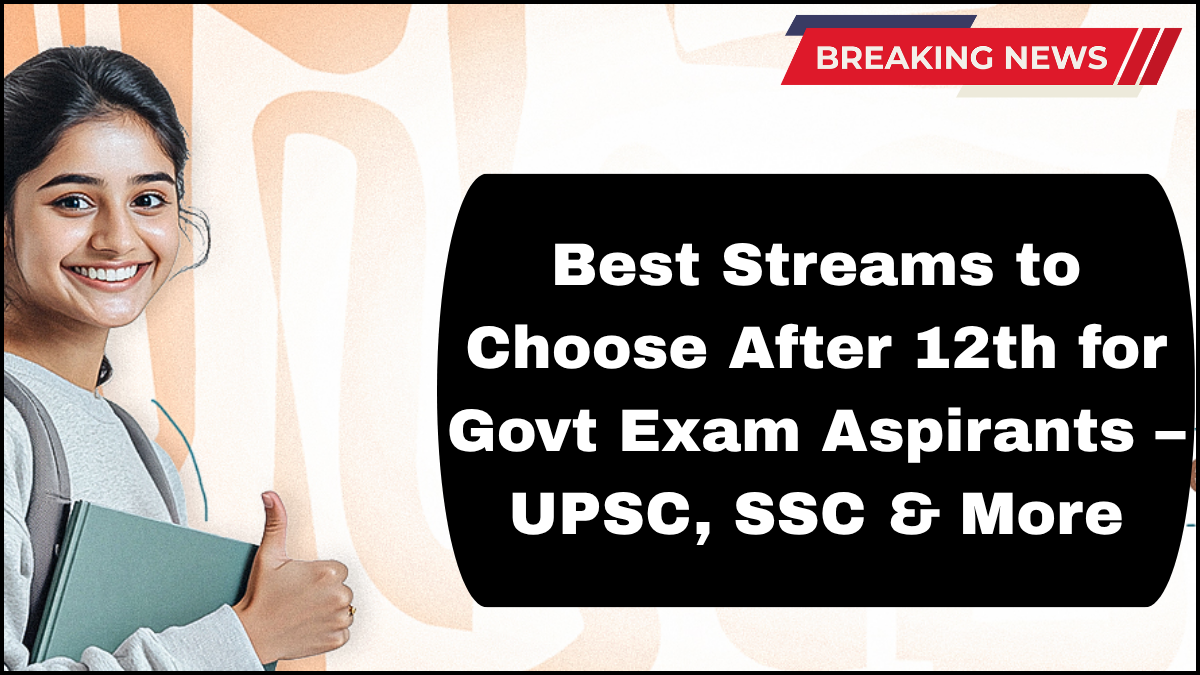Choosing the right academic stream after 12th grade is a major decision—especially if you aim to crack competitive government exams like UPSC, SSC, or other public sector recruitments. The stream you pick lays the foundation for your preparation, shaping not just your academic path but also your understanding of crucial subjects tested in these exams.
This guide breaks down the best stream choices for government exam aspirants and offers clarity on how each can support your long-term goal of securing a prestigious government job.

Why Stream Selection Matters for Government Exams
Every government exam—be it UPSC, SSC, banking, or defense—tests candidates across a wide spectrum of knowledge areas: General Studies, Current Affairs, Aptitude, Reasoning, and Subject-Specific content. Your chosen stream can either align naturally with these areas or force you to play catch-up.
A strategic stream choice helps you:
-
Develop a strong conceptual base early.
-
Cover parts of the government exam syllabus during graduation.
-
Stay motivated with a curriculum aligned with your career goal.
H3: Best Streams for UPSC Aspirants
If you are aiming for the UPSC Civil Services Examination—arguably the toughest exam in India—then your stream after 12th should prepare you for both the Preliminary and Main stages.
1. Humanities / Arts
This is widely considered the best stream for govt exams preparation, especially UPSC. Here’s why:
-
Subjects like Political Science, History, Geography, Economics, and Sociology overlap heavily with the UPSC syllabus.
-
You build critical thinking, comprehension, and writing skills—key for essay and optional papers.
-
It prepares you for both GS papers and optional subjects, reducing additional study burden later.
Example: A student with Political Science as a major covers topics directly related to Indian Polity and International Relations—two important areas in the UPSC Mains.
2. Commerce
While not as popular as Arts, Commerce can be a solid choice for aspirants interested in finance-based government roles such as:
-
Indian Economic Services
-
SSC CGL (Accounts/Audit roles)
-
RBI Grade B
-
Banking exams (IBPS, SBI)
Commerce provides a good grasp of Economics, Accountancy, and Business Studies, which are useful in exams with financial or economic syllabi.
3. Science (Especially with Physics, Chemistry, Biology/Maths)
Though Science is not the typical UPSC/SSC best stream choice, it does offer some strategic advantages:
-
Analytical thinking and problem-solving skills gained through science subjects help in the CSAT paper of UPSC and Quantitative Aptitude in SSC.
-
Students from a science background can opt for subjects like Anthropology, Psychology, or Zoology as their optional in UPSC.
-
Ideal for aspirants eyeing ISRO, DRDO, or technical roles through SSC JE or other engineering-based exams.
H3: Best Streams for SSC and Other Central Govt Exams
For aspirants targeting SSC CGL, CHSL, or other recruitment exams, the requirements are slightly different. These exams focus more on General Awareness, Quantitative Aptitude, Reasoning, and English Comprehension.
1. Arts/Humanities
Still a strong contender, especially for SSC:
-
General studies subjects help with Static GK.
-
More flexibility to prepare alongside graduation.
-
Less academic pressure allows time for focused preparation.
2. Commerce
Useful for roles like Tax Assistant, Auditor, and Accountant under SSC:
-
You already study topics related to accounting and business laws.
-
Makes Tier 2 papers (Finance and Economics) easier if you go that route.
3. Vocational/Skill-Based Courses
Not traditionally academic, but if chosen wisely (like IT, stenography, or computer applications), they can open doors to:
-
Clerical or technical posts in railways, defense, and ministries.
-
Specific skill-based government exams.
H3: How to Decide – Factors to Consider
Choosing the best stream for govt exams preparation isn’t just about subjects. Here are a few smart ways to decide:
-
Aptitude and Interest: Love reading history or debating politics? Arts might be your natural fit.
-
Long-Term Vision: Want to work in RBI or finance sector? Commerce is more relevant.
-
Backup Career Plans: If civil services don’t work out, what’s your plan B? Choose a stream that keeps options open.
-
Available Coaching or Guidance: If your area lacks UPSC guidance but has good bank/SSC coaching, adjust accordingly.
H3: Final Word – There’s No “One Size Fits All”
There’s no universally best stream, but if your goal is clear, your stream should support it. Humanities gives you the best head start for UPSC. Commerce positions you well for financial roles. Science prepares you for technical exams or optional subjects in UPSC.
What matters most is consistency in preparation. Many toppers come from diverse academic backgrounds—what sets them apart is clarity, discipline, and focused effort.
FAQs
Q1. Which stream is best for UPSC preparation after 12th?
A: Humanities/Arts is the most aligned stream for UPSC due to its subject overlap with the exam syllabus.
Q2. Can a science student crack SSC or UPSC exams?
A: Absolutely. Many science graduates succeed in both SSC and UPSC. You may need to cover some extra subjects, but your logical and analytical skills will be a strong asset.
Q3. Is Commerce a good stream for government exams?
A: Yes. Commerce is especially good for roles involving accounts, finance, or economics in exams like SSC, RBI, and Indian Economic Services.
Q4. Should I choose my stream based only on government exam goals?
A: While exam preparation is important, also consider your interests, strengths, and career flexibility. A balanced approach is best.
Q5. Can I change my stream after graduation if I want to attempt UPSC?
A: You can’t change your undergraduate degree, but you can study for UPSC with any background. Optional subject selection in UPSC gives flexibility to pick any subject you’re comfortable with.
click here to learn more